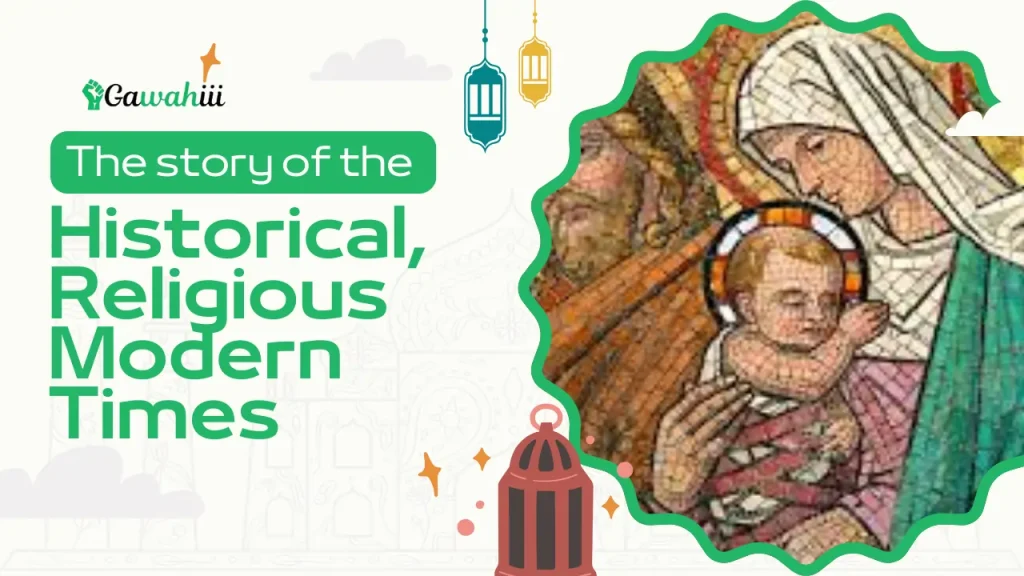introduction Historical, Religious and Modern Times
Islam means submission to Allah Almighty and unquestioning obedience to His command. This makes us understand that Islam did not begin with Prophet Muhammad (peace be upon him), but rather he is the last link in this chain of guidance. From Prophet Adam (peace be upon him) to the Day of Judgment, anyone who believes in Allah and His prophets and messengers is a Muslim. Therefore, we can say that all the prophets (peace be upon them) were Muslims, their basic belief was the belief in Islam. That is, believing in Allah Almighty as One and without partners in every respect.
The story of a Muslim can be seen in the context of historical, religious and the current developed era, and in this article we will introduce you to the tale of a Muslim from these angles.
Hazrat Muhammad (PBUH) The Central figure of Islam Historical, Religious and Modern Times
Although the chain of Islam began with Hazrat Adam (PBUH), but the responsibility of taking this chain to its peak was assigned to him (PBUH). For this reason, we can say that he is the central figure of Islam. His (PBUH) prophethood and mission were universal, and the book revealed to him (PBUH), the Holy Quran, is a source of guidance for people until the Day of Judgment. He (PBUH) set a practical example of the religion of Islam during his Meccan and Medinan periods, which spanned a period of 23 years, and prepared the best group of this nation, the Companions, may all be pleased with them all.
The Companions (PBUH) Lamps of Guidance
All the Companions and the Ahlul Bayt (PBUH) are the torches of the path of guidance, however, the names of the Rightly Guided Caliphs (Rashideen) stand out among them, who adopted the Prophetic method for establishing the religion and achieved great heights in Deen and the world.
Hazrat Abu Bakr Siddique (RA): A proverb in honesty and truthfulness. He was the first among men to embrace Islam. The strategy with which he suppressed the seditions that arose after the death of the Holy Prophet (PBUH) and re-established Islam, clearly shows his insight, foresight, bravery and courage.
Hazrat Umar (RA): Famous for justice and fairness. During his time, many heads of disbelief were defeated, and people were prosperous. Thus, it is narrated from Hazrat Abdullah bin Umar:
“The Holy Prophet (peace and blessings of Allah be upon him) said: I saw in a dream that I was drawing a large bucket from a well, on which a ‘wooden wheel’ was attached. Then Abu Bakr came and he also drew one or two buckets, but with weakness (indicating the short period of caliphate and the rise of tribulations), and may Allah forgive him. Then Umar came and in his hand that bucket turned into a very large bucket. I have not seen a strong and majestic person like him who can work with such strength. He drew so much that the people were watered and they watered their camels and took them to their places.” (Sahih Bukhari) (1)
Hazrat Uthman (may Allah be pleased with him): He earned a name for generosity. During his time, many areas were conquered and the boundaries of the Islamic Empire expanded far and wide.
Hazrat Ali (may Allah be pleased with him): He is second to none in bravery and valor. He fought bravely in battles like Uhud and never fled in any war. Hazrat Uthman and Hazrat Ali were killed brutally.
In addition to this, there is Hazrat Abu Hurairah who is famous for memorizing Hadith. Hazrat Ibn Abbas who became the “ink of the nation” due to the supplication of the Holy Prophet (ﷺ). It is narrated from Hazrat Ibn Abbas that the Holy Prophet (ﷺ) went to the toilet and I kept water for him. He said: “Who kept this?” He was told. So he said: “O Allah! Grant him understanding in religion.” (Sahih Bukhari) (2)
Later periods:
Umayyad Caliphate: Famous for promoting knowledge and wisdom. Baghdad and other big cities like it were considered centers of knowledge and science, which attracted researchers. (3)
The Ottoman Caliphate: It was an exemplary state in organizing diverse classes and religions, despite being an Islamic empire. Although various seditions, rebellions, and uprisings arose among Muslims during these periods as a result of mutual misunderstandings and external conspiracies, overall Islamic values were maintained during these periods. (4)
Muslim Scientists and Their Prominent Role:
Some famous Muslim scientists who laid the foundation of scientific knowledge are as follows:
- Physics: This includes Al-Kindi, Abu Rayhan Al-Biruni and Abdur Rahman bin Nusair.
- Mathematics: Al-Kindi and Muhammad Musa bin Al-Khwarizmi are more famous.
- Astronomy: Abu Ali Sina is also famous in this as well as medicine.
- Chemistry: Jabir bin Hayyan is known as the great father of chemistry. (5)
Stories of the Quran:
The Quran mentions the stories and events of many prophets and messengers, for example, from the birth of Hazrat Adam (AS) to his descent into the world. Hazrat Noah (AS), how he preached the religion of Allah Almighty, and when the people did not reform, the divine punishment overtook him. The immoral actions of the people of Hazrat Lot (AS) and the divine punishment that descended upon them. The story of Moses and Pharaoh, Abraham, who preached the message of monotheism. Joseph, who attained high status by enduring hardships. Similarly, the stories of Solomon and Jesus are mentioned in the Quran to some extent.
Modern-day stories – Stories of Muslim elders and scholars:
Although, in today’s era, there are countless individuals who have dedicated their lives to Islam and become a source of guidance for others, but here we mention a few famous personalities, whose blessings are still being benefited by Muslims all over the world:
Hazrat Maulana Mufti Taqi Usmani Sahib: With his expertise in modern economics, Islamic banking, Islamic jurisprudence, Quran and Hadith, he is a model for the entire Islamic world. (6)
Hazrat Maulana Tariq Jameel Sahib: A famous orator and preacher associated with the Tablighi Jamaat, whose gentle speech has changed the lives of countless people. (7)
Hazrat Maulana Pir Zulfiqar Ahmad Naqshbandi Sahib: A famous Sufi saint, whose mystical and sermonic style is being used by people all over the world. (8)
Personal Testimony: The Story of a Non-Muslim’s Conversion
Daisy, a Christian sister, says that I went to Saudi Arabia with the intention of spreading Christianity there, but when I met Muslims and they told me about Jesus (peace be upon him) — in the way that was not in the Bible — my curiosity about Islam increased. I learned that it is not the case that women are looked down upon in Islam, as we have this perception. I also had discussions with some priests. Surprisingly, they told me to obey God’s commandments, which helped me convert to Islam. I feel very good since I converted to Islam and I also request people to do their research. (9)
Muslims in Today’s Developed Modern World
In today’s era, where the world has become a “global village” and distances have narrowed, there are many non-Muslim countries where large numbers of Muslims live. Islam is spreading rapidly in such societies today. Wherever Muslims went in the past, they represented Islam while maintaining their identity and Islamic values and left a deep impression on the local people. Egypt, Syria, Iraq — all these countries were not originally Arab, but after the Muslim conquests, their culture and language changed. Even today, where Muslims truly represent Islam, non-Muslims are rapidly converting to Islam. Today, Islam has been declared the fastest-growing religion in the world. (10)
Children’s Stories
Where events and stories are narrated to teach, instruct and motivate adults, similarly, various types of stories are written for Muslim children – such as bedtime stories: honesty, trustworthiness, courage, justice and fairness, etc. – which are intended to instill Islamic values in children, so that they recognize the true spirit of Islam and do not get swept away in the flood of today’s growing Western civilization and culture.
Summary
The Muslim story consists of historical, religious and current situations, the most important of which is that of the Prophet Muhammad (peace be upon him). Then there are the stories of the Ahl al-Bayt and the Companions (may Allah be pleased with them), as well as the stories of previous prophets (peace be upon them), the stories of modern-day elders and scholars – who are sources of guidance. Similarly, the stories of non-Muslims converting to Islam and the stories of Muslims living in non-Muslim countries in today’s “globalization” era are also included.
- References
Sahih Bukhari, Hadith 3682
Sahih Bukhari, Hadith 143 - Britannica, T. Editors of Encyclopaedia (n.d.). Umayyad dynasty: Islamic history. Retrieved from
- Also read this :
- previous part







